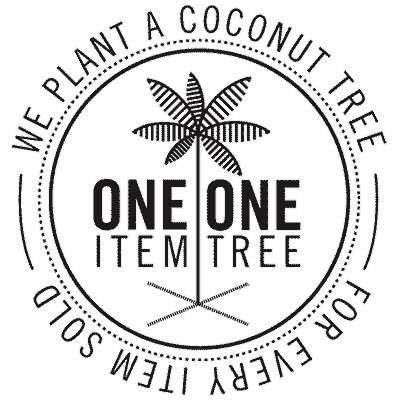The golden glow of bronze-tanned skin has become a symbol of an attractive-looking body. As pleasing as it is to the eye, achieving tan and beautiful-looking skin in a healthy way can be a long and challenging process. As sun exposure comes with health benefits and hazards, adjusting your tanning process by implementing several restrictions and using natural protection products is essential.
Good-looking, healthy, and well-nurtured tanned skin can be achieved with a slow tanning process and the help of coconut oil’s excellent tanning and protective properties! Coconut oil is famous for its many excellent cosmetic benefits. When used as a topical oil, it moisturizes the skin, aiding its elasticity, regeneration, and youthful appearance. So,
is coconut oil good for tanning? Although these properties are essential in topicals for sun-exposed skin, coconut oil
offers sun protection and induces tanning. Therefore, coconut oil is excellent for sun tanning and will provide the desired results, but only when used correctly.
How to Achieve Bronze and Tanned Skin Using Coconut Oil Tanning?
A sun-kissed tint is more about the hours spent protected in the shadows than the sun-exposed hours. To achieve the perfect coconut oil tan, it’s essential to stay out of the sun during peak hours, and when exposed to intense sun rays, use powerful sun protection to block UV rays. However, blocking the sun with high SPF prevents the skin from tanning, and exposure to the intense sun with low protection will result in sunburns. Coconut oil tanning is perfect for safe tanning oil with regular exposure during early morning and late afternoon hours when the sun is at its weakest. The low natural SPF of around six that coconut oil provides is perfect for building a solid base tan when exposed to healthy sun rays. The protective layer of saturated coconut oil fat on your skin provides just enough sun blockage during these hours, providing
safe sun tanning while keeping the skin moisturized and preventing it from burning and dehydration. Although there is a lot of debate about the safety of tanning, suntanning is beneficial for both our health and beauty when carefully controlled. Sun exposure is essential for our well-being, and to enjoy all the benefits of tanning, especially in the summertime, it’s essential to use the safest, healthiest, and most effective methods possible.
The Benefits of Tanning With Coconut Oil
As mentioned, coconut oil naturally possesses protective properties, hence its
low SPF of around 8. People that tan safely in short intervals and are only exposed to weak sun rays will find this protection sufficient. In addition, you can cover your body with a white long-sleeve shirt and a wide-brim hat for increased protection, provided solely by natural and healthy methods. Using natural oils as an alternative to artificial sunscreen comes with many benefits. By avoiding artificial sunscreen designed only to block UV rays efficiently, you avoid applying harmful chemicals likely to damage your skin. On the other hand, coconut oil is helpful as sun protection and provides many additional benefits for skin health and a glowing appearance. Coconut oil is super hydrating, and it may
help you tan faster. So let’s consider why you should take coconut oil to the beach, pool, or backyard for that glorious tan.
Coconut oil is chemical-free
Daily use of sunscreen is strongly recommended when one is exposed to the sun for an extended period. Sunscreen and tanning oils designed to block UV rays contain harmful ingredients like parabens, chemicals, and solvents that can irritate the skin and result in other complex health issues. While these potentially adverse ingredients block harmful UV rays, they may also prevent skin exposure to beneficial sun rays essential for our overall health. Raw organic coconut oil doesn’t possess any of the harmful ingredients mentioned. It possesses the natural ability to protect the skin from harmful UV rays while nourishing the skin. Coconut oil feels great on the skin, even when the skin is protected with clothes. All-natural coconut oil can be sunscreen for all body parts,
including the face. On the contrary, many artificial sunscreens and tanning oils are designed for separate body or face use only, and some chemicals can be harsh on sensitive facial skin.
It nourishes and protects the skin.
Unlike many commercial tanning products, coconut oil provides a nurturing benefit as well as a protective one. Its
medium-chain fatty acids (capric, caprylic, and lauric) provide skin-loving nourishment and help keep your skin healthy while you are tanning. In addition, the high level of saturated fats in coconut oil creates a protective layer for the skin and can help shield it from sun damage and ultraviolet radiation. Nourishing and moisturizing the skin is essential to keep the skin hydrated. By keeping your skin hydrated, you’ll enjoy a longer-lasting bronze tan.
It speeds up the tanning process.
When applied to the skin, coconut oil, like many other topical oils, creates a thin layer. The layer of coconut oil helps UV rays, both UVA and UVB rays, to penetrate the skin more efficiently to reach the melanocytes and stimulate the production of melanin – the skin pigment that makes the skin appear darker. Amplifying the effects of UV rays is beneficial for fast tanning. However, it may also get you sunburned. Therefore, to avoid sunburns, exposure to the sun should be limited to shorter intervals during weak sun periods. Using coconut oil makes you tan quicker while spending less time under the sun.
It helps the natural production of vitamin D
Sunlight is the only precursor our body needs to synthesize the much-needed vitamin D., Unlike sunscreen, using pure coconut oil for tanning won’t block the
UV rays necessary for vitamin D production. Instead, coconut oil aids the formation of vitamin D while providing sufficient UV protection. Vitamin D is essential for disease protection, healthy skin, bone growth and development, and mental and emotional health. However, in its external form, it can only be acquired with sun exposure. Therefore, it is essential to sunbathe using raw organic
coconut oil that won’t block the beneficial UV rays essential for vitamin D production.
It guards against infections.
With its well-known antimicrobial and antifungal properties, coconut oil
helps combat germs or harmful elements that might negatively affect your skin health. In addition, coconut oil has a high concentration of lauric acid, a fatty acid responsible for the antimicrobial properties of coconut oil that can kill harmful pathogens such as bacteria, fungi, and viruses. The antimicrobial properties of coconut oil make it a must-have item when heading to the beach or pool. These places have a high concentration of people during the summer, resulting in the easy transmission of viruses and fungal infections. In addition, during the time spent in the water or sunbathing, people expose more of their skin, in which circumstances to come in contact with harmful bacteria are high. A protective layer of coconut oil high in lauric acid will help prevent infections.
It soothes irritation
Does your skin need a little TLC when you’re outside? Do you often deal with annoying sunburn, redness, and inflammation that ruins your fun? All you need to achieve smooth skin and even skin tone is to slather some coconut oil on the affected areas. The hydrating magic of coconut oil can take care of those problems, make your skin feel smoother, and give it a healthy glow. For women, coconut oil is a lifesaver for waxing or shaving irritation. In addition, coconut oil is the perfect item to have when preparing to look excellent on the beach; it benefits great tanning and helps you stay protected while there, as it is also ideal for after-sun pampering and even sunburns, should that occur.
It supports tanning through your diet.
Your diet is another factor that plays a role in skin health and how well and fast you tan. For example, your daily amount of fat directly influences the tanning process and your production of vitamin D. Saturated fats, such as the one found in coconut oil, are helpful in the production of vitamin D, promote healthy skin, and induce melanin production in the tanning process. Therefore, coconut oil should be on your skin and food if you want to reap the most benefits from sunbathing and tanning.
It has a long shelf life
Kapuluan Raw Organic Coconut Oil for tanning has a shelf life of 36 months when properly stored. That means keeping it out of direct sunlight and in room temperature conditions with plenty of airflow.
How to Apply Coconut Oil for Tanning
It’s simple: squeeze out what you need and massage it all over your body. Depending on your levels of water exposure, you may need to re-apply if you’re swimming, although coconut oil penetrates deeply and should last for an extended period.



